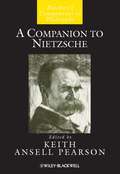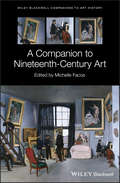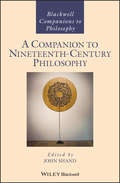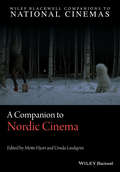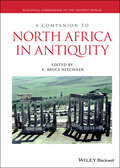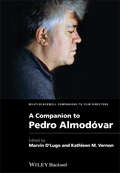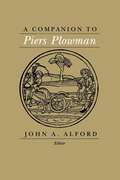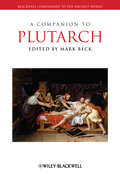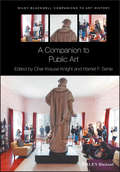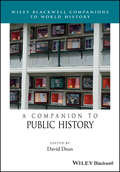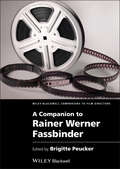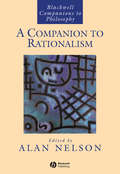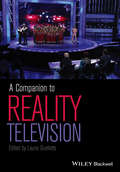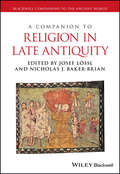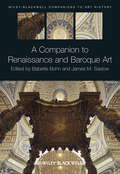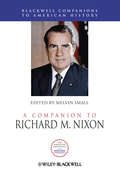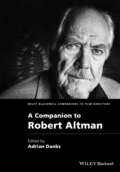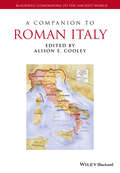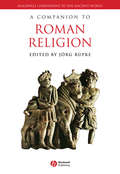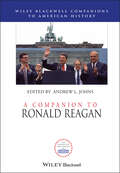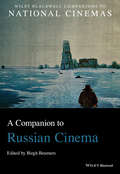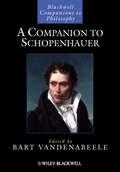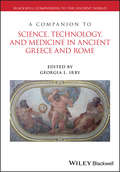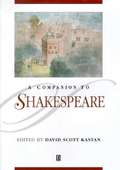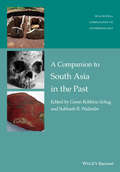- Table View
- List View
A Companion to Nietzsche (Blackwell Companions to Philosophy #120)
by Keith Ansell PearsonA Companion to Nietzsche provides a comprehensive guide to all the main aspects of Nietzsche's philosophy, profiling the most recent research and trends in scholarship. Brings together an international roster of both rising stars and established scholars, including many of the leading commentators and interpreters of Nietzsche. Showcases the latest trends in Nietzsche scholarship, such as the renewed focus on Nietzsche’s philosophy of time, of nature, and of life. Includes clearly organized sections on Art, Nature, and Individuation; Nietzsche's New Philosophy of the Future; Eternal Recurrence, the Overhuman, and Nihilism; Philosophy of Mind; Philosophy and Genealogy; Ethics; Politics; Aesthetics; Evolution and Life. Features fresh treatments of Nietzsche’s core and enigmatic doctrines.
A Companion to Nineteenth-Century Art (Blackwell Companions to Art History)
by Dana ArnoldA comprehensive review of art in the first truly modern century A Companion to Nineteenth-Century Art contains contributions from an international panel of noted experts to offer a broad overview of both national and transnational developments, as well as new and innovative investigations of individual art works, artists, and issues. The text puts to rest the skewed perception of nineteenth-century art as primarily Paris-centric by including major developments beyond the French borders. The contributors present a more holistic and nuanced understanding of the art world during this first modern century. In addition to highlighting particular national identities of artists, A Companion to Nineteenth-Century Art also puts the focus on other aspects of identity including individual, ethnic, gender, and religious. The text explores a wealth of relevant topics such as: the challenges the artists faced; how artists learned their craft and how they met clients; the circumstances that affected artist’s choices and the opportunities they encountered; and where the public and critics experienced art. This important text: Offers a comprehensive review of nineteenth-century art that covers the most pressing issues and significant artists of the era Covers a wealth of important topics such as: ethnic and gender identity, certain general trends in the nineteenth century, an overview of the art market during the period, and much more Presents novel and valuable insights into familiar works and their artists Written for students of art history and those studying the history of the nineteenth century, A Companion to Nineteenth-Century Art offers a comprehensive review of the first modern era art with contributions from noted experts in the field.
A Companion to Nineteenth-Century Philosophy (Blackwell Companions to Philosophy)
by John ShandInvestigate the challenging and nuanced philosophy of the long nineteenth century from Kant to Bergson Philosophy in the nineteenth century was characterized by new ways of thinking, a desperate searching for new truths. As science, art, and religion were transformed by social pressures and changing worldviews, old certainties fell away, leaving many with a terrifying sense of loss and a realization that our view of things needed to be profoundly rethought. The Blackwell Companion to Nineteenth-Century Philosophy covers the developments, setbacks, upsets, and evolutions in the varied philosophy of the nineteenth century, beginning with an examination of Kant’s Transcendental Idealism, instrumental in the fundamental philosophical shifts that marked the beginning of this new and radical age in the history of philosophy. Guiding readers chronologically and thematically through the progression of nineteenth-century thinking, this guide emphasizes clear explanation and analysis of the core ideas of nineteenth-century philosophy in an historically transitional period. It covers the most important philosophers of the era, including Hegel, Fichte, Schopenhauer, Mill, Kierkegaard, Marx, Nietzsche, Bradley, and philosophers whose work manifests the transition from the nineteenth century into the modern era, such as Sidgwick, Peirce, Husserl, Frege and Bergson. The study of nineteenth-century philosophy offers us insight into the origin and creation of the modern era. In this volume, readers will have access to a thorough and clear understanding of philosophy that shaped our world.
A Companion to Nordic Cinema
by Mette Hjort Ursula LindqvistA Companion to Nordic Cinema presents a collection of original essays that explore one of the world's oldest regional cinemas from its origins to the present day. Offers a comprehensive, transnational and regional account of Nordic cinema from its origins to the present day Features original contributions from more than two dozen international film scholars based in the Nordic countries, the United States, Canada, Scotland, and Hong Kong Covers a wide range of topics on the distinctive evolution of Nordic cinema including the silent Golden Age, Nordic film policy models and their influence, audiences and cinephilia, Nordic film training, and indigenous Sámi cinema. Considers Nordic cinema's engagement with global audiences through coverage of such topics as Dogme 95, the avant-garde filmmaking movement begun by Danish directors Lars von Trier and Thomas Vinterberg, and the global marketing and distribution of Nordic horror and Nordic noir Offers fresh investigations of the work of global auteurs such as Carl Th. Dreyer, Ingmar Bergman, Lars von Trier, Aki Kaurismäki, and Roy Andersson. Includes essays on Danish and Swedish television dramas, Finland's eco-documentary film production, the emerging tradition of Icelandic cinema, the changing dynamics of Scandinavian porn, and many more
A Companion to North Africa in Antiquity (Blackwell Companions to the Ancient World)
by R. Bruce HitchnerExplore a one-of-a-kind and authoritative resource on Ancient North Africa A Companion to North Africa in Antiquity, edited by a recognized leader in the field, is the first reference work of its kind in English. It provides a comprehensive introduction to all aspects of North Africa's rich history from the Protohistoric period through Late Antiquity (1000 BCE to the 800 CE). Comprised of twenty-four thematic and topical essays by established and emerging scholars covering the area between ancient Tripolitania and the Atlantic Ocean, including the Sahara, the volume introduces readers to Ancient North Africa's environment, peoples, institutions, literature, art, economy and more, taking into account the significant body of new research and fieldwork that has been produced over the last fifty years. A Companion to North Africa in Antiquity is an essential resource for anyone interested in this important region of the Ancient World.
A Companion to Pedro Almdovar
by Kathleen M. Vernon Marvin D'LugoEdited by leading authorities on the subject, and bringing together a stellar cast of contributors, this detailed appraisal of Pedro Almodóvar's unique cinematic art examines the themes, style, and aesthetics of his oeuvre and locates it in the context of the profound cultural transformations in Spain since the 1970s.Brings together a stellar cast of contributors from across the globe including recognized and established specialists as well as talented younger scholars Features contributions by Spanish film historians, where studies of Almodóvar's work have been underrepresented in the academic literatureDeploys new approaches to the analysis of film authorship by exploring contextual issues such as Almodóvar's transnational appeal and the political dimensions of his worksTraces the director's fruitful collaborations in the areas of art and design, fashion and music
A Companion to Piers Plowman
by John A. AlfordA Companion to Piers Plowman is the first comprehensive guide to William Langland's fourteenth-century masterpiece. Until now no single volume has discussed the broad range of issues raised here, nor have previous studies drawn on such an internationally distinguished group of Langland scholars.
A Companion to Plutarch (Blackwell Companions to the Ancient World)
by Mark BeckA Companion to Plutarch offers a broad survey of the famous historian and biographer; a coherent, comprehensive, and elegant presentation of Plutarch’s thought and influence Constitutes the first survey of its kind, a unified and accessible guide that offers a comprehensive discussion of all major aspects of Plutarch’s oeuvre Provides essential background information on Plutarch’s world, including his own circle of influential friends (Greek and Roman), his travels, his political activity, and his relations with Trajan and other emperors Offers contextualizing background, the literary and cultural details that shed light on some of the fundamental aspects of Plutarch’s thought Surveys the ideologically crucial reception of the Greek Classical Period in Plutarch’s writings Follows the currents of recent serious scholarship, discussing perennial interests, and delving into topics and works not formerly given serious attention
A Companion to Public Art (Blackwell Companions to Art History)
by Dana ArnoldA Companion to Public Art is the only scholarly volume to examine the main issues, theories, and practices of public art on a comprehensive scale. Edited by two distinguished scholars with contributions from art historians, critics, curators, and art administrators, as well as artists themselves Includes 19 essays in four sections: tradition, site, audience, and critical frameworks Covers important topics in the field, including valorizing victims, public art in urban landscapes and on university campuses, the role of digital technologies, jury selection committees, and the intersection of public art and mass media Contains “artist’s philosophy” essays, which address larger questions about an artist’s body of work and the field of public art, by Julian Bonder, eteam (Hajoe Moderegger and Franziska Lamprecht), John Craig Freeman, Antony Gormley, Suzanne Lacy, Caleb Neelon, Tatzu Nishi, Greg Sholette, and Alan Sonfist.
A Companion to Public History (Wiley Blackwell Companions to World History)
by David DeanAn authoritative overview of the developing field of public history reflecting theory and practice around the globe This unique reference guides readers through this relatively new field of historical inquiry, exploring the varieties and forms of public history, its relationship with popular history, and the ways in which the field has evolved internationally over the past thirty years. Comprised of thirty-four essays written by a group of leading international scholars and public history practitioners, the work not only introduces readers to the latest scholarly academic research, but also to the practice and pedagogy of public history. It pays equal attention to the emergence of public history as a distinct field of historical inquiry in North America, the importance of popular history and ‘history from below’ in Europe and European colonial-settler states, and forms of historical consciousness in non-Western countries and peoples. It also provides a timely guide to the state of the discipline, and offers an innovative and unprecedented engagement with methodological and theoretical problems associated with public history. Generously illustrated throughout, The Companion to Public History’s chapters are written from a variety of perspectives by contributors from all continents and from a wide variety of backgrounds, disciplines, and experiences. It is an excellent source for getting readers to think about history in the public realm, and how present day concerns shape the ways in which we engage with and represent the past. Cutting-edge companion volume for a developing area of study Comprises 36 essays by leading authorities on all aspects of public history around the world Reflects different national/regional interpretations of public history Offers some essays in teachable forms: an interview, a roundtable discussion, a document analysis, a photo essay. Covers a full range of public history practice, including museums, archives, memorial sites as well as historical fiction, theatre, re-enactment societies and digital gaming Discusses the continuing challenges presented by history within our broad, collective memory, including museum controversies, repatriation issues, ‘textbook’ wars, and commissions for Truth and Reconciliation The Companion is intended for senior undergraduate students and graduate students in the rapidly growing field of public history and will appeal to those teaching public history or who wish to introduce a public history dimension to their courses.
A Companion to Rainer Werner Fassbinder
by Brigitte PeuckerA Companion to Rainer Werner Fassbinder is the first of its kind to engage with this important figure. Twenty-eight essays by an international group of scholars consider this controversial director's contribution to German cinema, German history, gender studies, and auteurship.A fresh collection of original research providing diverse perspectives on Fassbinder's work in films, television, poetry, and underground theatre.Rainer Werner Fassbinder remains the preeminent filmmaker of the New German Cinema whose brief but prolific body of work spans from the latter half of the 1960s to the artist's death in 1982.Interrogates Fassbinder's influence on the seminal ideas of his time: auteurship, identity, race, queer studies, and the cataclysmic events of German twentieth century historyContributions from internationally diverse scholars specializing in film, culture, and German studies.Includes coverage of his key films including: Gods of the Plague (1970), Beware of a Holy Whore (1971), The Bitter Tears of Petra von Kant (1972), Martha (1973) (TV), World on a Wire (1973), Effi Briest (1974), Ali: Fear Eats the Soul (1974), Fox and His Friends (1975), Fear of Fear (1975), Chinese Roulette (1976), In a Year With 13 Moons (1978), Despair (1978), The Third Generation (1979), Berlin Alexanderplatz (1980) (TV), and Querelle (1982).
A Companion to Rationalism (Blackwell Companions to Philosophy #38)
by Alan NelsonThis book is a wide-ranging examination of rationalist thought in philosophy from ancient times to the present day. Written by a superbly qualified cast of philosophers Critically analyses the concept of rationalism Focuses principally on the golden age of rationalism in the seventeenth and early eighteenth centuries Also covers ancient rationalism, nineteenth-century rationalism, and rationalist themes in recent thought Organised chronologically Various philosophical methods and viewpoints are represented
A Companion to Reality Television (Blackwell Companions In Cultural Studies)
by Laurie OuelletteInternational in scope and more comprehensive than existing collections, A Companion to Reality Television presents a complete guide to the study of reality, factual and nonfiction television entertainment, encompassing a wide range of formats and incorporating cutting-edge work in critical, social and political theory. Original in bringing cutting-edge work in critical, social and political theory into the conversation about reality TV Consolidates the latest, broadest range of scholarship on the politics of reality television and its vexed relationship to culture, society, identity, democracy, and “ordinary people” in the media Includes primetime reality entertainment as well as precursors such as daytime talk shows in the scope of discussion Contributions from a list of international, leading scholars in this field
A Companion to Religion in Late Antiquity (Blackwell Companions to the Ancient World)
by Nicholas J. Baker-Brian Josef LösslA comprehensive review of the development, geographic spread, and cultural influence of religion in Late Antiquity A Companion to Religion in Late Antiquity offers an authoritative and comprehensive survey of religion in Late Antiquity. This historical era spanned from the second century to the eighth century of the Common Era. With contributions from leading scholars in the field, the Companion explores the evolution and development of religion and the role various religions played in the cultural, political, and social transformations of the late antique period. The authors examine the theories and methods used in the study of religion during this period, consider the most notable historical developments, and reveal how religions spread geographically. The authors also review the major religious traditions that emerged in Late Antiquity and include reflections on the interaction of these religions within their particular societies and cultures. This important Companion: Brings together in one volume the work of a notable team of international scholars Explores the principal geographical divisions of the late antique world Offers a deep examination of the predominant religions of Late Antiquity Examines established views in the scholarly assessment of the religions of Late Antiquity Includes information on the current trends in late-antique scholarship on religion Written for scholars and students of religion, A Companion to Religion in Late Antiquity offers a comprehensive survey of religion and the influence religion played in the culture, politics, and social change during the late antique period.
A Companion to Renaissance and Baroque Art (Blackwell Companions to Art History #29)
by Dana ArnoldA Companion to Renaissance and Baroque Art provides a diverse, fresh collection of accessible, comprehensive essays addressing key issues for European art produced between 1300 and 1700, a period that might be termed the beginning of modern history. Presents a collection of original, in-depth essays from art experts that address various aspects of European visual arts produced from circa 1300 to 1700 Divided into five broad conceptual headings: Social-Historical Factors in Artistic Production; Creative Process and Social Stature of the Artist; The Object: Art as Material Culture; The Message: Subjects and Meanings; and The Viewer, the Critic, and the Historian: Reception and Interpretation as Cultural Discourse Covers many topics not typically included in collections of this nature, such as Judaism and the arts, architectural treatises, the global Renaissance in arts, the new natural sciences and the arts, art and religion, and gender and sexuality Features essays on the arts of the domestic life, sexuality and gender, and the art and production of tapestries, conservation/technology, and the metaphor of theater Focuses on Western and Central Europe and that territory's interactions with neighboring civilizations and distant discoveries Includes illustrations as well as links to images not included in the book
A Companion to Richard M. Nixon (Wiley Blackwell Companions to American History)
by Melvin SmallThis companion offers an overview of Richard M. Nixon’s life, presidency, and legacy, as well as a detailed look at the evolution and current state, of Nixon scholarship. Examines the central arguments and scholarly debates that surround his term in office Explores Nixon’s legacy and the historical significance of his years as president Covers the full range of topics, from his campaigns for Congress, to his career as Vice-President, to his presidency and Watergate Makes extensive use of the recent paper and electronic releases from the Nixon Presidential Materials Project
A Companion to Robert Altman (Wiley Blackwell Companions to Film Directors)
by Adrian DanksA Companion to Robert Altman presents myriad aspects of Altman’s life, career, influence and historical context. This book features 23 essays from a range of experts in the field, providing extensive coverage of these aspects and dimensions of Altman’s work. The most expansive and wide-ranging book yet published on Altman, providing a comprehensive account of Altman’s complete career Provides discussion and analysis of generally neglected aspects of Altman’s career, including the significance of his work in television and industrial film, the importance of collaboration, and the full range and import of his aesthetic innovations Includes essays by key scholars in “Altman studies”, bringing together experts in the field, emerging scholars and writers from a broad range of fields Multi-disciplinary in design and draws on a range of approaches to Altman’s work, being the first substantial publication to make use of the recently launched Robert Altman Archive at the University of Michigan Offers specific insights into particular aspects of film style and their application, industrial and aesthetic film and TV history, and particular areas such as the theorisation of space, place, authorship and gender
A Companion to Roman Italy (Blackwell Companions to the Ancient World #125)
by Alison E. CooleyA Companion to Roman Italy investigates the impact of Rome in all its forms—political, cultural, social, and economic—upon Italy’s various regions, as well as the extent to which unification occurred as Rome became the capital of Italy. The collection presents new archaeological data relating to the sites of Roman Italy Contributions discuss new theories of how to understand cultural change in the Italian peninsula Combines detailed case-studies of particular sites with wider-ranging thematic chapters Leading contributors not only make accessible the most recent work on Roman Italy, but also offer fresh insight on long standing debates
A Companion to Roman Religion (Blackwell Companions to the Ancient World #78)
by Jörg RüpkeA comprehensive treatment of the significant symbols and institutions of Roman religion, this companion places the various religious symbols, discourses, and practices, including Judaism and Christianity, into a larger framework to reveal the sprawling landscape of the Roman religion. An innovative introduction to Roman religion Approaches the field with a focus on the human-figures instead of the gods Analyzes religious changes from the eighth century BC to the fourth century AD Offers the first history of religious motifs on coins and household/everyday utensils Presents Roman religion within its cultural, social, and historical contexts
A Companion to Ronald Reagan (Wiley Blackwell Companions to American History)
by Andrew L. JohnsA Companion to Ronald Reagan evaluates in unprecedented detail the events, policies, politics, and people of Reagan’s administration. It assesses the scope and influence of his various careers within the context of the times, providing wide-ranging coverage of his administration, and his legacy. Assesses Reagan and his impact on the development of the United States based on new documentary evidence and engagement with the most recent secondary literature Offers a mix of historiographic chapters devoted to foreign and domestic policy, with topics integrated thematically and chronologically Includes a section on key figures associated politically and personally with Reagan
A Companion to Russian Cinema (Wiley Blackwell Companions to National Cinemas #6)
by Birgit BeumersA Companion to Russian Cinema provides an exhaustive and carefully organised guide to the cinema of pre-Revolutionary Russia, of the Soviet era, as well as post-Soviet Russian cinema, edited by one of the most established and knowledgeable scholars in Russian cinema studies. The most up-to-date and thorough coverage of Russian, Soviet and post-Soviet cinema, which also effectively fills gaps in the existing scholarship in the field This is the first volume on Russian cinema to explore specifically the history of movie theatres, studios, and educational institutions The editor is one of the most established and knowledgeable scholars in Russian cinema studies, and contributions come from leading experts in the field of Russian Studies, Film Studies and Visual Culture Chapters consider the arts of scriptwriting, sound, production design, costumes and cinematography Provides five portraits of key figures in Soviet and Russia film history, whose works have been somewhat neglected
A Companion to Schopenhauer (Blackwell Companions to Philosophy #123)
by Bart VandenabeeleA Companion to Schopenhauer provides a comprehensive guide to all the important facets of Schopenhauer’s philosophy. The volume contains 26 newly commissioned essays by prominent Schopenhauer scholars working in the field today. A thoroughly comprehensive guide to the life, work, and thought of Arthur Schopenhauer Demonstrates the range of Schopenhauer’s work and illuminates the debates it has generated 26 newly commissioned essays by some of the most prominent Schopenhauer scholars working today reflect the very latest trends in Schopenhauer scholarship Covers the full range of historical and philosophical perspectives on Schopenhauer’s work Discusses his seminal contributions to our understanding of knowledge, perception, morality, science, logic and mathematics, Platonic Ideas, the unconscious, aesthetic experience, art, colours, sexuality, will, compassion, pessimism, tragedy, pleasure, and happiness
A Companion to Science, Technology, and Medicine in Ancient Greece and Rome: 2 Volume Set (Blackwell Companions to the Ancient World #144)
by Georgia L. IrbyA Companion to Science, Technology, and Medicine in Ancient Greece and Rome brings a fresh perspective to the study of these disciplines in the ancient world, with 60 chapters examining these topics from a variety of critical and technical perspectives. Brings a fresh perspective to the study of science, technology, and medicine in the ancient world, with 60 chapters examining these topics from a variety of critical and technical perspectives Begins coverage in 600 BCE and includes sections on the later Roman Empire and beyond, featuring discussion of the transmission and reception of these ideas into the Renaissance Investigates key disciplines, concepts, and movements in ancient science, technology, and medicine within the historical, cultural, and philosophical contexts of Greek and Roman society Organizes its content in two halves: the first focuses on mathematical and natural sciences; the second focuses on cultural applications and interdisciplinary themes 2 Volumes
A Companion to Shakespeare
by David S. KastanA Companion to Shakespeare is an indispensable book for readers of Shakespeare and anyone with an interest in his works. In 28 newly commissioned essays, this volume offers a remarkably innovative and comprehensive picture of the theatrical, literary, intellectual and social worlds in which Shakespeare wrote and produced his plays. <P>Each individual essay stands as an authoritative account of the state of knowledge in its field, and provides a new and compelling portrait of the historical conditions, both imaginative and institutional, that enabled (and in some cases inhibited) Shakespeare's great art. <P>Topics covered include the organization and regulation of Elizabethan playing, printing, and publication; the circulation of the play-texts: Shakespeare's reading; religion and political thought in England in late Elizabethan and Jacobean England: and the linguistic and literary environment in which he wrote.
A Companion to South Asia in the Past
by Gwen Robbins Schug Subhash R. WalimbeA Companion to South Asia in the Past provides the definitive overview of research and knowledge about South Asia's past, from the Pleistocene to the historic era in India, Pakistan, Sri Lanka, Bangladesh and Nepal, provided by a truly global team of experts. The most comprehensive and detailed scholarly treatment of South Asian archaeology and biological anthropology, providing ground-breaking new ideas and future challenges Provides an in-depth and broad view of the current state of knowledge about South Asia's past, from the Pleistocene to the historic era in India, Pakistan, Sri Lanka, Bangladesh and Nepal A comprehensive treatment of research in a crucial region for human evolution and biocultural adaptation A global team of scholars together present a varied set of perspectives on South Asian pre- and proto-history
